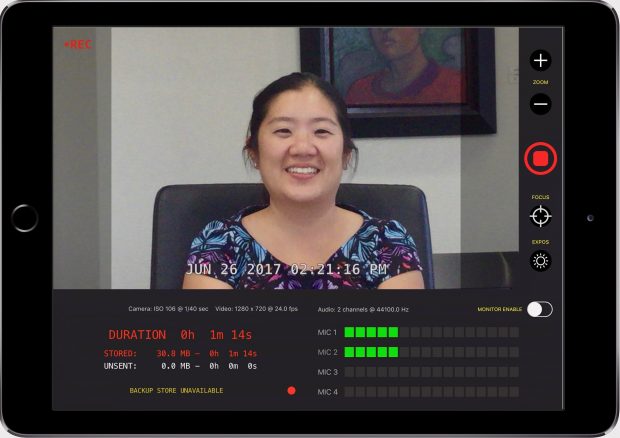 If you have ever ordered a video recorded deposition, you’ll know that it is expensive. It’s typically done through the court reporting agency, who sends a certified videographer to the depo. The videographer brings a cart of recording equipment to record the audio and video. This can cost as much as $1,800 for a day of video recording.
If you have ever ordered a video recorded deposition, you’ll know that it is expensive. It’s typically done through the court reporting agency, who sends a certified videographer to the depo. The videographer brings a cart of recording equipment to record the audio and video. This can cost as much as $1,800 for a day of video recording.
Audio/video technology has changed a lot in the last 30 years, and as is often the case, the legal field has not caught-up with the rest of the world. For example, ten years ago this week, Apple released the first iPhone with a stunning 2.0-megapixel camera. Two years later, the iPhone got the ability to record in VHS-quality videos. Now, we have cameras in cell phones that record in 4k, have sensors that perform in low light, and have a variety of zoom and exposure tools. In short, they are sufficient to capture the video of a person’s head and chest in a well-lit conference room, sitting a few feet from the camera. So, why are we paying $200 an hour and bringing in movie-making equipment to record a deposition?
What Is Required to Record a Depo?
Experienced Operator
You might be surprised to know that most states don’t require any type of certification to record video depositions, just to transcribe them. So, you need a certified court reporter to take down what is being said, which becomes the official record. The video, which is not an official record, does not need to be recorded by anyone certified.
The National Court Reporters Association provides the Certified Legal Video Specialist certification, which requires taking a three-day seminar followed by several tests. It also regulates, through a code of ethics, a set of legal videography standards, and it mandates that people with a CLVS certification complete continuing education. That being said, being a member of the NCRA or having a CLVS certification is not a requirement to record a depo. An experienced operator will do things like monitor the sound output and make sure the equipment is properly recording throughout the deposition, and know about the rules in depositions (for example, what to do when one attorney demands to go off the record, but the other attorney wants the deponent to answer the question before going off record).
Hardware
Video recording a deposition requires not only an adequate camera; more importantly, it requires a good microphone. Nuances in video, like an eyelash twitch, are not going to likely be crucial in trial when you play back a video clip, but having clear sound — especially when people mumble when they are nervous, talk over each other, whisper under their breath, or let out an exasperated sigh before answering a question — can all make a huge difference when playing a clip back at trial. While an iPhone or an Android phone or even a high-quality camcorder might be able to pick up the video, it is not enough to pick up clear audio.
So What’s the Solution?
Just because you know how to record a video on your phone of your kids playing in the park does not mean you should record a deposition. There are a number of things to keep track of when recording a deposition. For example, if a witness begins to slouch after hour three of questioning and he or she is no longer in the frame, that would need to be adjusted. You do not want to be focusing on asking the questions, absorbing the answers, and monitoring the video frame. Same goes for the audio, only the audio is more important. This is usually done with headphones during the deposition to listen to the audio that is picked up from the microphones. You certainly don’t want to be taking a depo with headphones on.
One company, StoryCloud, provides a hybrid solution between hiring a traditional videographer and doing it yourself. They have certified videographers that record depositions on an iPad using their app. They use external microphones to record audio, and they have the videographer monitor the audio and video feed throughout the deposition. Here is a screenshot of their app as they record a deposition:

She seems pretty happy for a deponent.
As they record it, they also save a copy to the cloud, and you get a copy of your video as you leave the depo. According to their website, they charge a flat fee of between $300 and up to $700 for a full day of video recording. They also offer remote video live streaming so co-counsel or clients can watch the video remotely.
Although you would usually associate cost as a factor that primarily attracts plaintiffs’ lawyers who front money out of pocket on cases for years before they can get reimbursed, the StoryCloud website lists several defense firms, including K&L Gates, that use their services.
Conclusion
Much like the taxi industry, which had an advanced knowledge of how to drive to places, and charged people a lot of money for doing that until technology came around and shook up the industry, legal videographers might be in for a little shake-up in the near future.
Jeff Bennion is a solo practitioner at the Law Office of Jeff Bennion. He serves as a member of the Board of Directors of San Diego’s plaintiffs’ trial lawyers association, Consumer Attorneys of San Diego. He is also the Education Chair and Executive Committee member of the State Bar of California’s Law Practice Management and Technology section. He is a member of the Advisory Council and instructor at UCSD’s Litigation Technology Management program. His opinions are his own. Follow him on Twitter here or on Facebook here, or contact him by email at [email protected].






